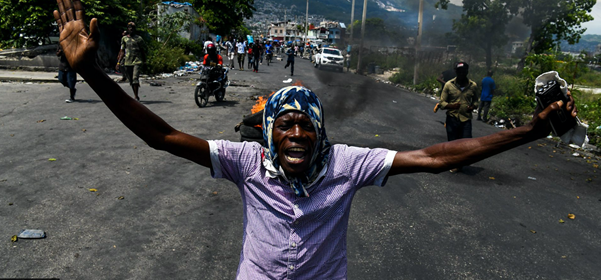A Haitian Unrest

Written By Shamal Harave
Many thousands of people have started protesting on the streets of the Haitian capital city, Port-au-Prince,
and other cities. They are protesting against the government, burning barricades of burning tyres and debris, demanding the resignation of the suspected corrupt president
Jovenel Moïse. The legitimacy of Mr Moïse has been the trigger to the nation’s new bitter unrest.
Mr Moïse insists that he took to the office on 7 February 2017, however his opposition and many Haitian citizens argue that his five year
term should’ve ended on the 7th of February 2021; because there is
now evidence showing that the result of the 2015 election was won by Mr Moïse. The one year
delay was caused by several allegations of electoral fraud.
Since then, Mr Moïse’s Time as president has not gone too well,
as he has repeatedly faced accusations of corruption and been tested by wave after wave of violent anti-government protests. Over the past decade, around $4 billion has been
given to Haiti as a development fund, to help Haiti grow and advance to support the 60% of people that live under the poverty line. The development fund was made possible by
the PetroCaribe program, which allows multiple Latin American and Caribbean countries to benefit from Venezuelan
loans under a system of preferential oil delivery.
Conversely, the president has been accused of taking bribes and acting in a correct manner, and the majority of the large $4 billion sum has been
mismanaged and stolen by the government. One of the activists said, “how cruel can you be, to steal money and resources from people who don’t have anything.”
Since his administrative team failed to hold scheduled legislative elections in October 2019, President Moïse has been ruling by decree.
On the 7th of February this year, when his opposition rightly claimed that his terms should have ended, a coup was organised (we don’t know who by yet but there are suspicions that it was organised by his opposition) to overthrow his government and assassinate him, but the plan was foiled. 23 alleged coup plotters were detained. This included Supreme Court judge Ivickel Dabresil who had previously been chosen by the opposition to act as a “provisional president,” replacing Moïse. Though, with him in detention, another Supreme Court judge was named in his place as interim leader, Joseph Mécène Jean-Louis. On the other hand, some local commentators said that the president had organised a counter coup to bolster his position and suppress his opponents.
Jovenel Moïse has been heavily criticised about his use of decree to push through policies and his corruption in the PetroCaribe scandal. Additionally, he’s been criticised for postponing the legislative elections to October 2021.
The government of the United States, the United Nations, and the Organisation of American States (OAS) have all shown support for Mr Moïse to
continue leading the Caribbean country of Haiti until he holds fair elections this October. It is seen in the eyes of many as the best strategy to avoid greater chaos.